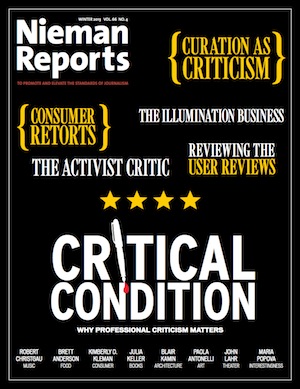Here, Maria Popova tries to define one path for criticism: “I write about books, but I don’t write reviews. I write recommendations, based on my own taste.”
 “Reading criticism clogs conduits through which one gets new ideas: cultural cholesterol,” Susan Sontag wrote in her diary in 1964. “In certain kinds of writing, particularly in art criticism and literary criticism, it is normal to come across long passages which are almost completely lacking in meaning,” George Orwell cautioned in “Politics and the English Language.” Zadie Smith lamented “the essential hubris of criticism,” noting, “When I write criticism I’m in such a protected position: Here are my arguments…here my rhetorical flourish. One feels very pleased with oneself.”
“Reading criticism clogs conduits through which one gets new ideas: cultural cholesterol,” Susan Sontag wrote in her diary in 1964. “In certain kinds of writing, particularly in art criticism and literary criticism, it is normal to come across long passages which are almost completely lacking in meaning,” George Orwell cautioned in “Politics and the English Language.” Zadie Smith lamented “the essential hubris of criticism,” noting, “When I write criticism I’m in such a protected position: Here are my arguments…here my rhetorical flourish. One feels very pleased with oneself.”
Bedeviled by these pitfalls as traditional criticism might be — an echo chamber of ideas, vacant verbosity, protected preciousness — online criticism has arguably only exacerbated the issue.
But in conceiving of criticism as a value system for what is “good” or “bad,” worthy or unworthy, there is another, implicit shape “criticism” can take — a celebration of the good by systematic omission of the bad. To put in front of the reader only works that are worthy, and to celebrate those with a consistent editorial standard, is to create a framework for what “good” means, and thus to implicitly outline the “bad,” the unworthy, by way of negative space around the good. The celebrator then becomes a critic without being critical — at least not with the abrasive connotations the term has come to bear — yet upholds the standards of “good” and “bad” work with just as much rigor.